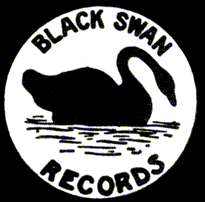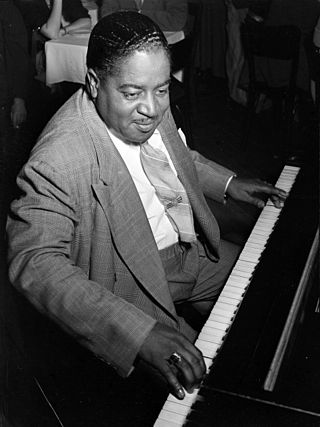Related Research Articles
James Edwards Yancey was an American boogie-woogie pianist, composer, and lyricist. One reviewer described him as "one of the pioneers of this raucous, rapid-fire, eight-to-the-bar piano style".
Boogie-woogie is a genre of blues music that became popular during the late 1920s, developed in African-American communities since the 1870s. It was eventually extended from piano to piano duo and trio, guitar, big band, country and western music, and gospel. While standard blues traditionally expresses a variety of emotions, boogie-woogie is mainly dance music. The genre had a significant influence on rhythm and blues and rock and roll.

Black Swan Records was an American jazz and blues record label founded in 1921 in Harlem, New York. It was the first widely distributed label to be owned, operated, and marketed to African Americans. Founded by Harry Pace with W.C. Handy, Black Swan Records was established to give African Americans more creative liberties. Eighteen months earlier, in 1919, the Broome Special Phonograph Records was the earliest label owned and operated by African American George W. Broome in Medford, Massachusetts, featuring Black classical musicians including Harry T. Burleigh and Edward Boatner. Black Swan was revived in the 1990s for CD reissues of its historic jazz and blues recordings.

Mamie Smith was an American singer. As a vaudeville singer, she performed in multiple styles, including jazz and blues. In 1920, she entered blues history as the first African-American artist to make vocal blues recordings. Willie "The Lion" Smith described the background of these recordings in his autobiography Music on My Mind (1964).

Lou Donaldson is an American retired jazz alto saxophonist. He is best known for his soulful, bluesy approach to playing the alto saxophone, although in his formative years he was, as many were of the bebop era, heavily influenced by Charlie Parker.

Albert Clifton Ammons was an American pianist and player of boogie-woogie, a blues style popular from the late 1930s to the mid-1940s.

Pete Johnson was an American boogie-woogie and jazz pianist.
Clarence Smith, better known as Pinetop Smith or Pine Top Smith, was an American boogie-woogie style blues pianist. His hit tune "Pine Top's Boogie Woogie" featured rhythmic "breaks" that were an essential ingredient of ragtime music, but also a fundamental foreshadowing of rock and roll. The song was also the first known use of the term "boogie woogie" on a record, and cemented that term as the moniker for the genre.

Sippie Wallace was an American blues singer, pianist and songwriter. Her early career in tent shows gained her the billing "The Texas Nightingale". Between 1923 and 1927, she recorded over 40 songs for Okeh Records, many written by her or her brothers, George and Hersal Thomas. Her accompanists included Louis Armstrong, Johnny Dodds, Sidney Bechet, King Oliver, and Clarence Williams. Among the top female blues vocalists of her era, Wallace ranked with Ma Rainey, Ida Cox, Alberta Hunter, and Bessie Smith.
Restvale Cemetery opened in 1927 and is located at 11700 S. Laramie Ave. in Alsip, Illinois, United States, a suburb southwest of the city of Chicago. A number of Chicago blues musicians, educators, and notable people are buried here.
"Kansas City Shuffle" is the name of a 1926 jazz song.
"Ain't Nobody's Business" is a 1920s blues song that became one of the first blues standards. It was published in 1922 by Porter Grainger and Everett Robbins. The song features a lyrical theme of freedom of choice and a vaudeville jazz–style musical arrangement. It was first recorded, as "'Tain't Nobody's Biz-ness if I Do", in 1922 by Anna Meyers, backed by the Original Memphis Five.
Johnny Dunn was an American traditional jazz trumpeter and vaudeville performer, who was born in Memphis, Tennessee. He is probably best known for his work during the 1920s with musicians such as Perry Bradford or Noble Sissle. He has been compared in sound and style to both King Oliver and Louis Armstrong. In 1922, he recorded as a member of Mamie Smith's Jazz Hounds, together with Garvin Bushell, Coleman Hawkins, Everett Robbins, Bubber Miley and Herb Flemming.
James Louis Blythe was an American jazz and boogie-woogie pianist and composer. Blythe is known to have recorded as many as 300 piano rolls, and his song "Chicago Stomp" is considered one of the earliest examples of boogie-woogie music to be recorded.

"Roll 'Em Pete" is a blues song, originally recorded in December 1938 by Big Joe Turner and pianist Pete Johnson. The recording is regarded as one of the most important precursors of what later became known as rock and roll.
Porter Grainger was an American pianist, songwriter, playwright, and music publisher.
William Ezell, was an American blues, jazz, ragtime and boogie-woogie pianist and occasional singer, who was also billed as Will Ezell. He regularly contributed to recordings made by Paramount Records in the late 1920s and early 1930s. Ezell was noted by the music journalist Bruce Eder as "a technically brilliant pianist, showing the strong influence of jazz as well as blues in his work".
Helen Gross was an American classic female blues singer, active as a recording artist in the mid-1920s. Songs she recorded include "I Wanna Jazz Some More", "Bloody Razor Blues", and "Strange Man".
Thomas F. McFarland, known professionally as Barrelhouse Buck McFarland was an American blues and boogie-woogie pianist, singer and composer. He first recorded material in the early 1930s, but had to wait until three decades later, before providing his 'barrelhouse' swan song.
References
- ↑ Hennessey, Thomas (1994) From Jazz to Swing: African American Jazz Musicians and Their Music, 1890 - 1935, p. 58. Wayne State University Press At Google Books. Retrieved 15 May 2013.
- 1 2 Frank Himpsl Archive "Everett Robbins" Retrieved 15 May 2013.
- 1 2 3 Dinosaur Discs (July 1964). Record Research 61.
- ↑ Record Research, Numbers 57-72. Record Research., 1964 at Google Books. Retrieved 15 May 2013.
- ↑ Gushee, Lawrence (2005) Pioneers of Jazz: The Story of the Creole Band, p. 246. Oxford University Press at Google Books. Retrieved 15 May 2013.
- ↑ Gibbs, Craig Martin (2012) Black Recording Artists, 1877-1926: An Annotated Discography, p. 196. McFarland At Google Books. Retrieved 15 May 2013.
- ↑ Yanow, Scott Biography: Bob Shoffner allmusic. Retrieved 15 May 2013.
- ↑ Gibbs, Craig Martin (2012) Black Recording Artists, 1877-1926: An Annotated Discography, p. 111-2. McFarland At Google Books. Retrieved 15 May 2013.
- ↑ Gibbs, Craig Martin (2012) Black Recording Artists, 1877-1926: An Annotated Discography, p. 404. McFarland At Google Books. Retrieved 15 May 2013.
- ↑ Boogie Woogie Blues allmusic. Retrieved 15 May 2013.
- ↑ "Credits" allmusic. Retrieved 15 May 2013.